- Home
- Bruce Sterling
Red Star, Winter Orbit
Red Star, Winter Orbit Read online
Red Star, Winter Orbit
Bruce Sterling
William Gibson
Bruce Sterling William Gibson
Red Star, Winter Orbit
Colonel Korolev twisted slowly in his harness, dreaming of winter and gravity. Young again, a cadet, he whipped his horse across the late November steppes of Kazakhstan into dry red vistas of Martian sunset.
That's wrong, he thought-
And woke-in the Museum of the Soviet Triumph in Space-to the sounds of Romanenko and the KGB man's wife. They were going at it again behind the screen at the aft end of the Salyut, restraining straps and padded hull creaking and thudding rhythmically. Hooves in the snow.
Freeing himself from the harness, Korolev executed a practiced kick that propelled him into the toilet stall. Shrugging out of his threadbare coverall, he clamped the commode around his loins and wiped condensed steam from the steel mirror. His arthritic hand had swollen again during sleep; the wrist was bird-bone thin from calcium loss. Twenty years had passed since he'd last known gravity; he'd grown old in orbit.
He shaved with a suction razor. A patchwork of broken veins blotched his left cheek and temple, another legacy from the blowout that had crippled him.
When he emerged, he found that the adulterers had finished. Romanenko was adjusting his clothing. The Political Officer's wife, Valentina, had ripped the sleeves from her brown coverall; her white arms were sheened with the sweat of their exertion. Her ash-blond hair rippled in the breeze from a ventilator. Her eyes were purest cornflower blue, set a little too closely together, and they held a look half-apologetic, half-conspiratorial. "See what we've brought you, Colonel-"
She handed him a tiny airline bottle of cognac.
Stunned, Korolev blinked at the Air France logo embossed on the plastic cap.
"It came in the last Soyuz. In a cucumber, my husband said." She giggled. "He gave it to me."
"We decided you should have it, Colonel," Romanenko said, grinning broadly. "After all, we can be furloughed at any time." Korolev ignored the sidelong, embarrassed glance at his shriveled legs and pale, dangling feet.
He opened the bottle, and the rich aroma brought a sudden tingling rush of blood to his cheeks. He raised it carefully and sucked out a few milliliters of brandy. It burned like acid. "Christ," he gasped, "it's been years. I'll get plastered!" He said, laughing, tears blurring his vision.
"My father tells me you drank like a hero, Colonel, in the old days."
"Yes," Korolev said, and sipped again, "I did." The cognac spread through him like liquid gold. He disliked Romanenko. He'd never liked the boy's father, either-an easygoing Party man, long since settled into lecture tours, a dacha on the Black Sea, American liquor, French suits, Italian shoes... '. The boy had the father's looks, the same clear gray eyes utterly untroubled by doubt.
The alcohol surged through Korolev's thin blood. "You are too generous," he said. He kicked once gently and arrived at his console. "You must take some samis data, American cable broadcasts, freshly intercepted. Racy stuff! Wasted on an old man like me." He slotted a blank cassette and punched for the material.
"I'll give it to the gun crew," Romanenko said, grinning. "They can run it on the tracking consoles in the gun room." The particle-beam station had always been known as the gun room. The soldiers who manned it were particularly hungry for this sort of tape. Korolev ran off a second copy for Valentina.
"It's dirty?" She looked alarmed and intrigued. "May we come again, Colonel? Thursday at 2400?"
Korolev smiled at her. She had been a factory worker before she'd been singled out for space. Her beauty made her useful as a propaganda tool, a role model for the proletariat. He pitied her now, with the cognac coursing through his veins, and found it impossible to deny her a little happiness. "A midnight rendezvous in the museum, Valentina? Romantic!"
She kissed his cheek, wobbling in free fall. "Thank you, my Colonel."
"You're a prince, Colonel," Romanenko said, slapping Korolev's match-stick shoulder as gently as he could. After countless hours on an exerciser, the boy's arms bulged like a blacksmith's.
Korolev watched the lovers carefully make their way out into the central docking sphere, the junction of three aging Salyuts and two corridors. Romanenko took the "north" corridor to the gun room; Valentina went in the opposite direction to the next junction sphere and the Salyut where her husband slept.
There were five docking spheres in Kosmograd, each with its three linked Salyuts. At opposite ends of the complex were the military installation and the satellite launchers. Popping, humming, and wheezing, the station had the feel of a subway and the dank metallic reek of a tramp steamer.
Korolev had another pull at the bottle. Now it was half empty. He hid it in one of the museum's exhibits, a NASA Hasselblad recovered from the site of the Apollo landing. He hadn't had a drink since his last furlough, before the blowout. His head swam in a pleasant, painful current of drunken nostalgia.
Drifting back to his console, he accessed a section of memory where the collected speeches of Alexei Kosygin had been covertly erased and replaced with his personal collection of samisdata, digitized pop music, his boyhood favorites from the Eighties. He had British groups taped from West German radio, Warsaw Pact heavy metal, American imports from the black market. Putting on his headphones, he punched for the Czestochowa reggae of Brygada Cryzis.
After all the years, he no longer really heard the music, but images came rushing back with an aching poignancy. In the Eighties he'd been a long-haired child of the Soviet elite, his father's position placing him effectively beyond the reach of the Moscow police. He remembered feedback howling through the speakers in the hot darkness of a cellar club, the crowd a shadowy checkerboard of denim and bleached hair. He'd smoked Marlboros laced with powdered Afghani hash. He remembered the mouth of an American diplomat's daughter in the backseat of her father's black Lincoln. Names and faces came flooding in on a warm haze of cognac. Nina, the East German who'd shown him her mimeographed translations of dissident
Polish news sheets-
Until the night she didn't turn up at the coffee bar. Whispers of parasitism, of anti-Soviet activity, of the waiting chemical horrors of the psikuska-
Korolev started to tremble. He wiped his face and found it bathed in sweat. He took off the headphones.
It had been fifty years, yet he was suddenly and very intensely afraid. He couldn't remember ever having been this frightened, not even during the blowout that had crushed his hip. He shook violently. The lights. The lights in the Salyut were too bright, but he didn't want to go to the switches. A simple action, one he performed regularly, yet ... The switches and their insulated cables were somehow threatening. He stared, confused. The little clockwork model of a Lunokhod moon rover, its Velcro wheels gripping the curved wall, seemed to crouch there like something sentient, poised, waiting. The eyes of the Soviet space pioneers in the official portraits were fixed on him with contempt.
The cognac. His years in free fail had warped his metabolism. He wasn't the man he'd once been. But he would remain calm and try to ride it out. If he threw up, everyone would laugh.
Someone knocked at the entrance to the museum, and Nikita the Plumber, Kosmograd's premier handyman, executed a perfect slow-motion dive through the open hatch. The young civilian engineer looked angry. Korolev felt cowed. "You're up early, Plumber," he said, anxious for some facade of normality.
"Pinhead leakage in Delta Three." He frowned. "Do you understand Japanese?" The Plumber tugged a cassette from one of the dozen pockets that bulged on his stained work-vest and waved it in Korolev's face. He wore carefully laundered Levi's and dilapidated Adidas running shoes. "We acc
essed this last night."
Korolev cowered as though the cassette were a weapon. "No, no Japanese." The meekness of his own voice startled him. "Only English and Polish." He felt himself blush. The Plumber was his friend; he knew and trusted the Plumber, but-
"Are you well, Colonel?" The Plumber loaded the tape and punched up a lexicon program with deft, calloused fingers. "You look as though you just ate a bug. I want you to hear this."
Korolev watched uneasily as the tape flickered into an ad for baseball gloves. The lexicon's Cyrillic subtitles raced across the monitor as a Japanese voice-over rattled maniacally.
"The newscast's coming up," said the Plumber, gnawing at a cuticle.
Korolev squinted anxiously as the translation slid across the face of the Japanese announcer:
AMERICAN DISARMAMENT GROUP CLAIMS ... PREPARATIONS AT BAIKONUR COSMODROME ... PROVE RUSSIANS AT LAST READY ... TO SCRAP ARMED SPACE STATION COMIC CITY ...
"Cosmic," the Plumber muttered. "Glitch in the lexicon."
BUILT AT TURN OF CENTURY AS BRIDGEHEAD TO SPACE ... AMBITIOUS PROJECT CRIPPLED BY FAILURE OF LUNAR MINING ... EXPENSIVE STATION OUTPERFORMED BY OUR UNMANNED ORBITAL FACTORIES ... CRYSTALS SEMICONDUCTORS AND PURE DRUGS ...
"Smug bastards." The Plumber snorted. "I tell you, it's that goddamned KGB man Yefremov. He's had a hand in this!"
STAGGERING SOVIET TRADE DEFICITS ... POPULAR DISCONTENT WITH SPACE EFFORT ... RECENT DECISIONS BY
POLITBURO AND CENTRAL COMMITTEE SECRETARIAT ...
"They're shutting us down!" The Plumber's face contorted with rage.
Korolev twisted away from the screen, shaking uncontrollably. Sudden tears peeled from his lashes in free-fall droplets. "Leave me alone! I can do nothing!"
"What's wrong, Colonel?" The Plumber grabbed his shoulders. "Look me in the face. Someone's dosed you with the Fear!"
"Go away," Korolev begged.
"That little spook bastard! What has he given you? Pills? An injection?"
Korolev shuddered. "I had a drink-"
"He gave you the Fear! You, a sick old man! I'll break his face!" The Plumber jerked his knees up, somersaulted backward, kicked off from a handhold overhead, and catapulted out of the room.
"Wait! Plumber!" But the Plumber had zipped through the docking sphere like a squirrel, vanishing down the corridor, and now Korolev felt that he couldn't bear to be alone. In the distance, he could hear metallic echoes of distorted, angry shouts.
Trembling, he closed his eyes and waited for someone to help him.
He'd asked Psychiatric Officer Bychkov to help him dress in his old uniform, the one with the Star of the Tsiolkovsky Order sewn above the left breast pocket. The black dress boots of heavy quilted nylon, with their Velcro soles, would no longer fit his twisted feet; so his feet remained bare.
Bychkov's injection had straightened him out within an hour, leaving him alternately depressed and furiously angry. Now he waited in the museum for Yefremov to answer his summons.
They called his home the Museum of the Soviet Triumph in Space, and as his rage subsided, to be replaced with an ancient bleakness, he felt very much as if he were simply another one of the exhibits. He stared gloomily at the gold-framed portraits of the great visionaries of space, at the faces of Tsiolkovsky, Rynin, Tupolev. Below these, in slightly smaller frames, were portraits of Verne, Goddard, and O'Neill.
In moments of extreme depression he had sometimes imagined that he could detect a common strangeness in their eyes, particularly in the eyes of the two Americans. Was it simply craziness, as he sometimes thought in his most cynical moods? Or was he able to glimpse a subtle manifestation of some weird, unbalanced force that he had often suspected of being human evolution in action?
Once, and only once, Korolev had seen that look in his own eyes-on the day he'd stepped onto the soil of the Coprates Basin. The Martian sunlight, glinting within his helmet visor, had shown him the reflection of two steady, alien eyes-fearless, yet driven-and the quiet, secret shock of it, he now realized, had been his life's most memorable, most transcendental moment.
Above the portraits, oily and inert, was a painting that depicted the landing in colors that reminded him of borscht and gravy, the Martian landscape reduced to the idealistic kitsch of Soviet Socialist realism. The artist had posed the suited figure beside the lander with all of the official style's deeply sincere vulgarity.
Feeling tainted, he awaited the arrival of Yefremov, the KGB man, Kosmograd's Political Officer.
When Yefremov finally entered the Salyut, Korolev noted the split lip and the fresh bruises on the man's throat. He wore a blue Kansai jump suit of Japanese silk and stylish Italian deck shoes. He coughed politely. "Good morning, Comrade Colonel."
Korolev stared. He allowed the silence to lengthen. "Yefremov," he said heavily, "I am not happy with you."
Yefremov reddened, but he held his gaze. "Let us speak frankly to each other, Colonel, as Russian to Russian. It was not, of course, intended for you."
"The Fear, Yefremov?"
"The beta-carboline, yes. I you hadn't pandered to their antisocial actions, if you hadn't accepted their bribe, it would not have happened."
"So I am a pimp, Yefremov? A pimp and a drunkard? You are a cuckold, a smuggler, and an informer. I say this," he added, "as one Russian to another."
Now the KGB man's face assumed the official mask of bland and untroubled righteousness.
"But tell me, Yefremov, what it is that you are really about. What have you been doing since you came to Kosmograd? We know that the complex will be stripped. What is in store for the civilian crew when they return to Baikonur? Corruption hearings?"
"There will be interrogation, certainly. In certain cases there may be hospitalization. Would you care to suggest, Colonel Korolev, that the Soviet Union is somehow at fault for Kosmograd's failures?"
Korolev was silent.
"Kosmograd was a dream, Colonel. A dream that failed. Like space. We have no need to be here. We have an entire world to put in order. Moscow is the greatest power in history. We must not allow ourselves to lose the global perspective."
"Do you think we can be brushed aside that easily? We are an elite, a highly trained technical elite."
"A minority, Colonel, an obsolete minority. What do you contribute, aside from reams of poisonous American trash? The crew here were intended to be workers, not bloated black marketeers trafficking in jazz and pornography." Yefremov's face was smooth and calm. "The crew will return to Baikonur. The weapons are capable of being directed from the ground. You, of course, will remain, and there will be guest cosmonauts: Africans, South Americans. Space still retains a degree of its former prestige for these people."
Korolev gritted his teeth. "What have you done with the boy?"
"Your Plumber?" The Political Officer frowned. "He has assaulted an officer of the Committee for State Security. He will remain under guard until he can be taken to Baikonur."
Korolev attempted an unpleasant laugh. "Let him go. You'll be in too much trouble yourself to press charges. I'll speak with Marshal Gubarev personally. My rank may be entirely honorary, Yefremov, but I do retain a certain influence."
The KGB man shrugged. "The gun crew are under orders from Baikonur to keep the communicators module under lock and key. Their careers depend on it."
"Martial law, then?"
"This isn't Kabul, Colonel. These are difficult times. You have the moral authority here; you should try to set an example."
"We shall see," Korolev said.
Kosmograd swung out of Earth's shadow into raw sunlight. The walls of Korolev's Salyut popped and creaked like a nest of glass bottles. A Salyut's viewports, Korolev thought absently, fingering the broken veins at his temple, were always the first things to go.
Young Grishkin seemed to have the same thought. He drew a tube of caulk from an ankle-pocket and began to inspect the seal around the viewport. He was the Plumber's assistant and closest friend.
"We must now vote," K
orolev said wearily. Eleven of Kosmograd's twenty-four civilian crew members had agreed to attend the meeting, twelve if he counted himself. That left thirteen who were either unwilling to risk involvement or else actively hostile to the idea of a strike. Yefremov and the six-man gun crew brought the total number of those not present to twenty. "We've discussed our demands. All those in favor of the list as it stands-" He raised his good hand. Three others raised theirs. Grishkin, busy at the viewport, stuck out his foot.
Korolev sighed. "There are few enough as it is. We'd best have unanimity. Let us hear your objections."
"The term military custody," said a biological technician named Korovkin, "might be construed as implying that the military, and not the criminal Yefremov, is responsible for the situation." The man looked acutely uncomfortable. "We are in sympathy otherwise but will not sign. We are Party members." He seemed about to add something but fell silent. "My mother," his wife said quietly, "was Jewish."
Korolev nodded, but he said nothing.
"This is all criminal foolishness," said Glushko, the botanist. Neither he nor his wife had voted. "Madness. Kosmograd is finished, we all know it, and the sooner home the better. What has this place ever been but a prison?" Free fall disagreed with the man's metabolism; in the absence of gravity blood tended to congest in his face and neck, making him resemble one of his experimental pumpkins.
"You are a botanist, Vasili," his wife said stiffly, "while
I, you will recall, am a Soyuz pilot. Your career is not at stake."
"I will not support this idiocy!" Glushko gave the bulkhead a savage kick that propelled him from the room. His wife followed, complaining bitterly in the grating undertone crew members learned to employ for private arguments.
"Five are willing to sign," Korolev said, "out of a civilian crew of twenty-four."
"Six," said Tatjana, the other Soyuz pilot, her dark hair drawn back and held with a braided band of green nylon webbing. "You forget the Plumber."
"The sun balloons!" cried Grishkin, pointing toward the earth. "Look!"

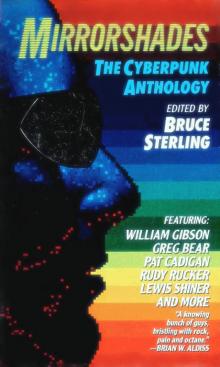 Mirrorshades: The Cyberpunk Anthology
Mirrorshades: The Cyberpunk Anthology The Wonderful Power of Storytelling
The Wonderful Power of Storytelling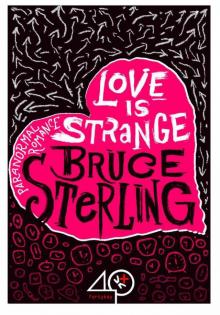 Love Is Strange (A Paranormal Romance)
Love Is Strange (A Paranormal Romance)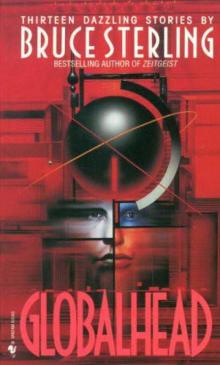 Globalhead
Globalhead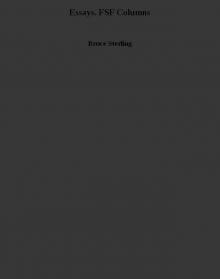 Essays. FSF Columns
Essays. FSF Columns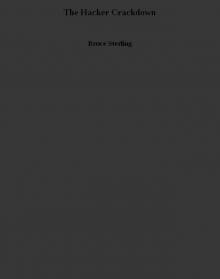 The Hacker Crackdown
The Hacker Crackdown Bicycle Repairman
Bicycle Repairman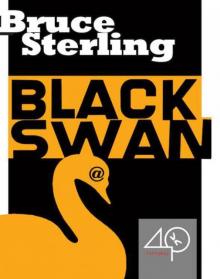 Black Swan
Black Swan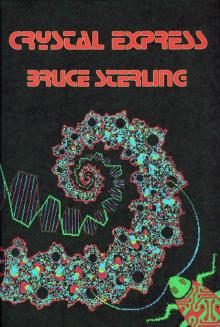 Crystal Express
Crystal Express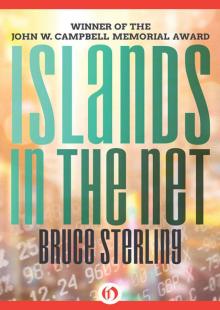 Islands in the Net
Islands in the Net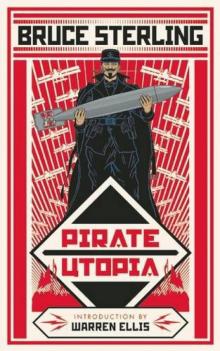 Pirate Utopia
Pirate Utopia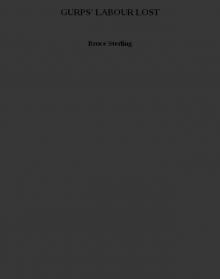 GURPS' LABOUR LOST
GURPS' LABOUR LOST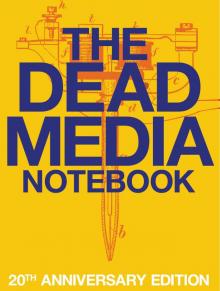 The Dead Media Notebook
The Dead Media Notebook Unstable Networks
Unstable Networks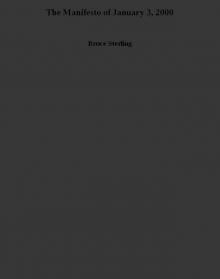 The Manifesto of January 3, 2000
The Manifesto of January 3, 2000 Heavy Weather
Heavy Weather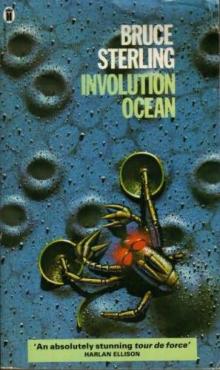 Involution Ocean
Involution Ocean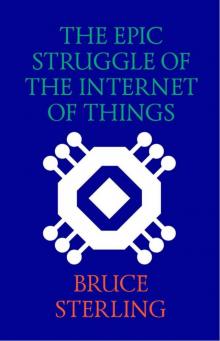 The Epic Struggle of the Internet of Things
The Epic Struggle of the Internet of Things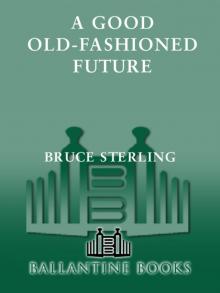 A Good Old-Fashioned Future
A Good Old-Fashioned Future The Littlest Jackal
The Littlest Jackal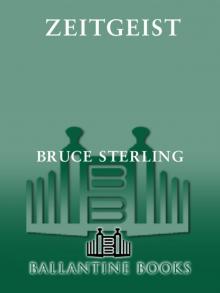 Zeitgeist
Zeitgeist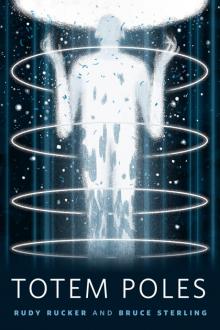 Totem Poles
Totem Poles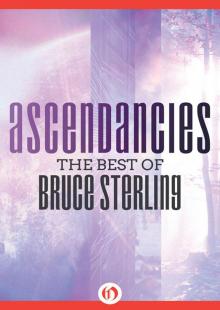 Ascendancies
Ascendancies CyberView 1991
CyberView 1991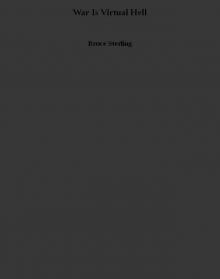 War Is Virtual Hell
War Is Virtual Hell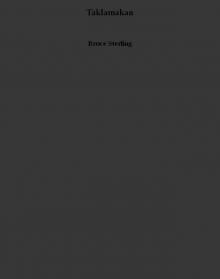 Taklamakan
Taklamakan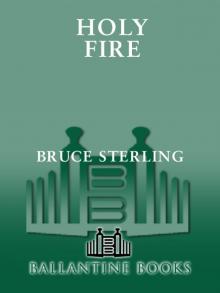 Holy Fire
Holy Fire Cyberpunk in the Nineties
Cyberpunk in the Nineties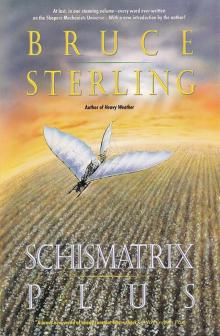 Schismatrix Plus
Schismatrix Plus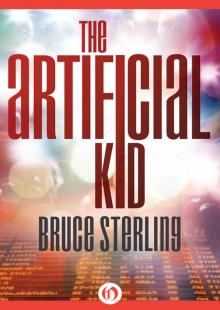 The Artificial Kid
The Artificial Kid Essays. Catscan Columns
Essays. Catscan Columns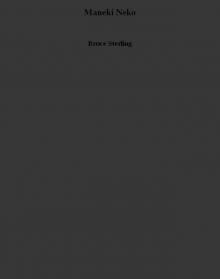 Maneki Neko
Maneki Neko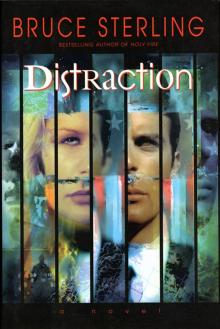 Distraction
Distraction In Paradise
In Paradise Red Star, Winter Orbit
Red Star, Winter Orbit Luciferase
Luciferase